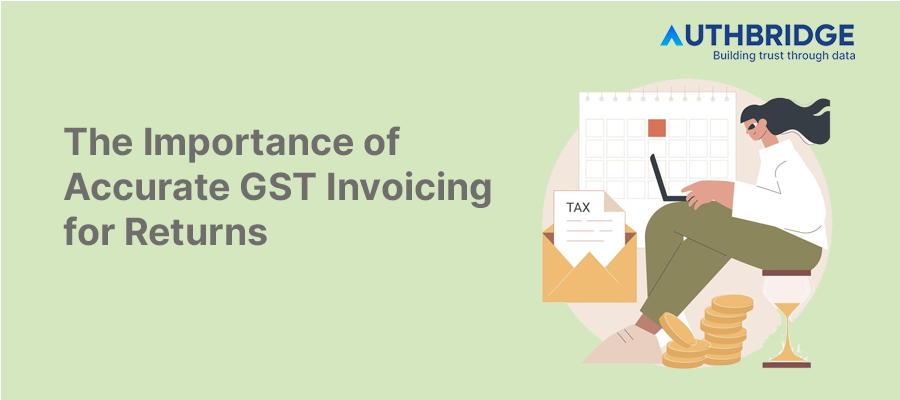Ensuring Accurate GST Invoicing: Why It Matters For Your Returns

1. Overview of GST Invoicing
Definition and Importance
GST invoicing is a critical aspect of tax compliance for businesses operating under the Goods and Services Tax (GST) regime. It involves the creation and issuance of invoices that adhere to the standards and requirements set by GST laws. Accurate GST invoicing is essential for both the supplier and the recipient, as it enables the correct levy and input tax credit (ITC) claims, ensuring transparency and compliance with tax regulations.
Key Components of a GST Invoice
A GST invoice must include several key components to be compliant:
- Supplier's details: Name, address, and GSTIN (GST Identification Number).
- Recipient's details: Name and address (if registered, GSTIN must be included).
- Invoice details: Unique invoice number, date of issuance, and place of supply.
- Product or service details: Description, quantity, unit of measure, total value.
- Tax details: Rate and amount of CGST, SGST/UTGST, IGST, and cess, if applicable.
- Signature: Digital or physical signature of the supplier or their authorized representative.
2. Common Mistakes in GST Invoicing and Filing
Incorrect Input Tax Credit (ITC) Claims
One of the most frequent errors involves claiming ITC inaccurately. This mistake can occur due to incorrect invoice details or failing to meet the eligibility criteria for ITC. It's crucial to ensure that all invoices used for ITC claims are compliant and reflect the actual transactions accurately.
Non-compliance with Reverse Charge Mechanism (RCM)
Under RCM, the recipient of goods or services is liable to pay GST directly to the government, instead of the supplier. Failing to account for RCM transactions in GST filings can lead to non-compliance and penalties.
Omission of Exempted Turnover
Businesses sometimes overlook or mistakenly omit exempted turnover while filing GST returns. It's important to report exempted turnover accurately to avoid discrepancies in tax filings.
Incorrect GST Category Filing
Selecting the wrong GST category for goods or services can lead to incorrect tax calculations. Businesses must classify their goods or services correctly under the GST tariff codes to ensure accurate tax liability.
Mismatch Between GSTR-3B and GSTR-1
Discrepancies between the details reported in GSTR-3B (summary return) and GSTR-1 (details of outward supplies) are common mistakes. Regular reconciliation between these returns is essential to maintain accuracy in reported data.
Errors in Invoice Data Entry
Mistakes in entering invoice details, such as incorrect GSTIN, invoice number, or taxable value, can lead to mismatches and complications in the tax filing process. Ensuring accurate data entry is critical for compliance and smooth ITC claims.
3. Consequences of Inaccurate GST Invoicing
Penalties and Fines
Inaccurate GST invoicing and filing can result in hefty penalties and fines. The GST law stipulates fines for various non-compliance issues, including incorrect invoicing, late filing, and underreporting of taxes.
Impact on Input Tax Credit Claims
Errors in GST invoicing directly affect the eligibility and claim of ITC. Inaccurate invoices may lead to denied ITC claims, affecting the cash flow and financial health of the business.
4. Best Practices for Accurate GST Invoicing
Regular Reconciliation of Invoices
Businesses should regularly reconcile their purchase and sales invoices with the GST returns filed by their suppliers and customers. This practice helps in identifying and rectifying discrepancies early.
Utilizing GST-Compliant Software
Investing in GST-compliant software can automate the invoicing and filing process, reducing the chances of human error. These software solutions also help in keeping track of updates and changes in GST regulations.
Staying Updated with GST Regulations
Keeping abreast of the latest GST notifications, circulars, and amendments is crucial for compliance. Regular training and updates for the accounting and finance teams can help in understanding and implementing GST provisions accurately.
5. FAQs on GST Invoicing
What is GST invoicing?
- GST invoicing involves creating invoices that comply with the GST regulations, including necessary details like GSTIN, invoice number, tax rates, and taxable value.
Is it mandatory to issue GST invoices?
- Yes, for registered GST businesses, it is mandatory to issue GST-compliant invoices for all taxable supplies of goods and services.
What are the penalties for incorrect GST invoicing?
- Penalties vary based on the nature of the error but can include fines, interest on unpaid taxes, and in severe cases, legal action.
How can businesses avoid common GST invoicing mistakes?
- Regular reconciliation, using GST-compliant software, and staying updated with GST laws are effective ways to avoid common mistakes.
Ensuring accurate GST invoicing is pivotal for tax compliance, avoiding penalties, and facilitating smooth ITC claims. By adhering to the best practices and staying vigilant about common pitfalls, businesses can navigate GST invoicing more effectively.
Category

Abhinandan Banerjee
(Associate Manager - Marketing)
Abhinandan is a dynamic Product and Content Marketer, boasting over seven years of experience in crafting impactful marketing strategies across diverse environments. Known for his strategic insights, he propels digital growth and boosts brand visibility by transforming complex ideas into compelling content that inspires action.



